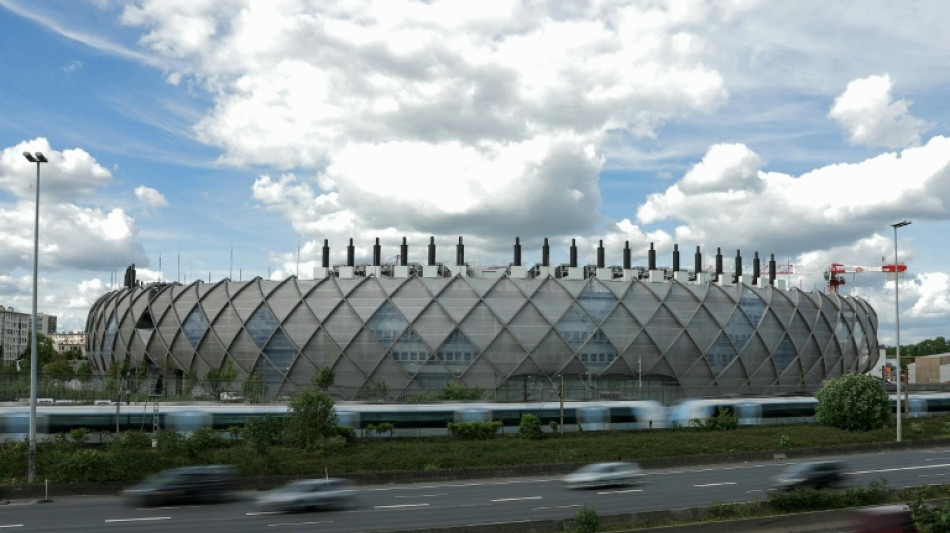
-
 Putin evokes WWII victory to rally Russia behind Ukraine offensive
Putin evokes WWII victory to rally Russia behind Ukraine offensive
-
China exports beat forecasts ahead of US tariff talks

-
 Leo XIV, the 'Latin Yankee', to celebrate first mass as pope
Leo XIV, the 'Latin Yankee', to celebrate first mass as pope
-
Most stocks lifted by hopes for US-China talks after UK deal

-
 IPL suspended indefinitely over India-Pakistan conflict: reports
IPL suspended indefinitely over India-Pakistan conflict: reports
-
German lender Commerzbank's profits jump as it fends off UniCredit

-
 Rare bone-eroding disease ruining lives in Kenya's poorest county
Rare bone-eroding disease ruining lives in Kenya's poorest county
-
India says repulsed fresh Pakistan attacks as de-escalation efforts grow

-
 Zhao's historic snooker title sparks talk of China world domination
Zhao's historic snooker title sparks talk of China world domination
-
'High expectations': EU looks to Merz for boost in tough times

-
 Poisoned guests rarely invited before deadly mushroom lunch, Australia trial hears
Poisoned guests rarely invited before deadly mushroom lunch, Australia trial hears
-
China sales to US slump even as exports beat forecasts

-
 Indian cricket to make 'final decision' on IPL over Pakistan conflict
Indian cricket to make 'final decision' on IPL over Pakistan conflict
-
Dethroned Bundesliga champions Leverkusen face uncertain future

-
 China can play hardball at looming trade talks with US: analysts
China can play hardball at looming trade talks with US: analysts
-
French monuments in trouble while PSG prepare for Champions League final

-
 Newcastle face Chelsea in top five showdown, Alexander-Arnold in spotlight
Newcastle face Chelsea in top five showdown, Alexander-Arnold in spotlight
-
Flick's Barca must show 'hunger' in crunch Liga Clasico

-
 Clasico the last chance saloon for Ancelotti's Real Madrid
Clasico the last chance saloon for Ancelotti's Real Madrid
-
Timberwolves overpower Warriors to level series

-
 Chinese fabric exporters anxious for US trade patch-up
Chinese fabric exporters anxious for US trade patch-up
-
Putin gears up to host world leaders at lavish army parade

-
 Nearing 100, Malaysian ex-PM Mahathir blasts 'old world' Trump
Nearing 100, Malaysian ex-PM Mahathir blasts 'old world' Trump
-
Leo XIV, first US pope, to celebrate first mass as pontiff

-
 Asian stocks lifted by hopes for US-China talks after UK deal
Asian stocks lifted by hopes for US-China talks after UK deal
-
Former head of crypto platform Celsius sentenced 12 years

-
 Ex-model testifies in NY court that Weinstein assaulted her at 16
Ex-model testifies in NY court that Weinstein assaulted her at 16
-
Nestlé and OMP Showcase Approach to Future-Ready Supply Chain at Gartner Supply Chain Symposium/Xpo in Barcelona

-
 Genflow Biosciences PLC Announces Share Subscription, Director's Dealing and Update
Genflow Biosciences PLC Announces Share Subscription, Director's Dealing and Update
-
Argo Blockchain PLC Announces 2024 Annual Results and Restoration of Listing

-
 'Great honor': world leaders welcome first US pope
'Great honor': world leaders welcome first US pope
-
Pacquiao to un-retire and fight Barrios for welterweight title: report

-
 Trump unveils UK trade deal, first since tariff blitz
Trump unveils UK trade deal, first since tariff blitz
-
Man Utd one step away from Europa League glory despite horror season

-
 Jeeno shines on greens to grab LPGA lead at Liberty National
Jeeno shines on greens to grab LPGA lead at Liberty National
-
Mitchell fires PGA career-low 61 to grab Truist lead

-
 AI tool uses selfies to predict biological age and cancer survival
AI tool uses selfies to predict biological age and cancer survival
-
Extremely online new pope unafraid to talk politics

-
 Postecoglou hits back as Spurs reach Europa League final
Postecoglou hits back as Spurs reach Europa League final
-
Chelsea ease into Conference League final against Betis

-
 Pope Leo XIV: Soft-spoken American spent decades amid poor in Peru
Pope Leo XIV: Soft-spoken American spent decades amid poor in Peru
-
First US pope shared articles critical of Trump, Vance

-
 'Inexcusable' - NBA champs Boston in trouble after letting big leads slip
'Inexcusable' - NBA champs Boston in trouble after letting big leads slip
-
US automakers blast Trump's UK trade deal

-
 Stocks mostly rise as US-UK unveil trade deal
Stocks mostly rise as US-UK unveil trade deal
-
Trump presses Russia for unconditional 30-day Ukraine ceasefire

-
 Anything but Europa League glory 'means nothing' for Man Utd: Amorim
Anything but Europa League glory 'means nothing' for Man Utd: Amorim
-
'Inexcuseable' - NBA champs Boston in trouble after letting big leads slip

-
 Pope Leo 'fell in love with Peru'and ceviche: Peru bishop
Pope Leo 'fell in love with Peru'and ceviche: Peru bishop
-
Pakistan's T20 cricket league moved to UAE over India conflict


France quietly catches rivals in battle for data centre supremacy
At the end of a narrow suburban street north of Paris, a giant structure shrouded in a skin of mesh and steel looks like a football stadium, but is in fact a vast data centre.
Paris Digital Park, which towers over four-storey apartment blocks and is owned by US firm Digital Realty, is one of more than 70 centres that ring the French capital -- more than a third of the country's total.
The government is pushing hard to expand an industry seen as the backbone of the digital economy, playing catch-up with established hubs like London and Frankfurt, and is so far avoiding the backlash that has slowed development elsewhere.
"The Paris region is the fourth largest hub in the world for content exchanges," Fabrice Coquio, President of Digital Realty France, told AFP on a recent tour of his firm's campus.
The capital region's data centre industry is already worth 1.2 billion euros ($1.3 billion), according to specialist consultancy Structure Research.
And Coquio, like everyone else in the industry, believes artificial intelligence is about to supercharge it.
He said the massive computing needs of AI would power a "second wave" of expansion for data centres, after the shift to cloud computing fuelled the first wave.
Jerome Totel of French firm Data4 said there were virtually no AI-ready data centres in France right now. But by 2030 data capacity would double in France, with between 30 and 40 percent of it dedicated to the technology, according to a recent report by trade group Datacenter.
That expansion will suck up power and land on a dramatic scale -- Coquio sees electricity usage at data centres doubling in the next four years.
But unlike in other parts of the world, there are few dissenting voices in France.
- 'Isolated' protests -
Concerns over energy and land use pushed Amsterdam and Dublin to restrict licences for new data centres -- helping Paris overtake the Dutch capital in the race for market share.
Frankfurt has clamped down on data centre sprawl with new zoning and energy rules.
And public protests have been seen recently from the Netherlands to the heart of the global industry in the US state of Virginia.
Yet in France, one of the few concerted efforts to block a centre was back in 2015 when Coquio's firm -- then known as Interxion -- had to overcome local protests and legal challenges to an earlier building.
Amazon's data centre arm, AWS, also backed off from a planned centre in 2021 after facing pushback in Bretigny-sur-Orge, in the south of Paris.
"Protests have existed and still exist, but they are very ad hoc and isolated," said Clement Marquet, a researcher at Paris-based engineering school Mines.
He said the objections had not gone beyond NIMBY, or "not in my backyard".
Those who had tried to widen the issue to the broader climate costs of digital developments "failed to bring people together over time and eventually gave up", said Marquet.
- Faster planning -
France already has some advantages that explain why data centre developments are not as divisive as in other countries.
It is much bigger than the Netherlands or Ireland, with much more free land and a less strained power grid.
Added to this, national laws largely restrict data centre companies to building on land already in industrial use.
Coquio stresses that his new Paris campus is built on a former Airbus helicopter plant.
Keeping developments mostly out of the public eye, tucked away next to motorways, in former factories, and on wasteland, has helped keep the public neutral about the centres.
However, this balance could be about to shift.
Before President Emmanuel Macron called snap elections in June that his centrist party lost, resulting in a hung parliament, his government had been trying to push through a law that would allow large data centres to be classified as projects of major national interest.
The idea would be to speed up planning processes and connection to the power grid.
Marquet said France should be moving in the opposite direction and putting more thought into planning.
"In the long term, we all need to think hard about the ecological consequences of digital growth in general," he said, labelling the current habit of ignoring climate concerns as "absurd".
But with the ramped-up computing needs of AI combining with looser regulation, the transformation of France's post-industrial suburbs looks set to continue apace.
J.Oliveira--AMWN

